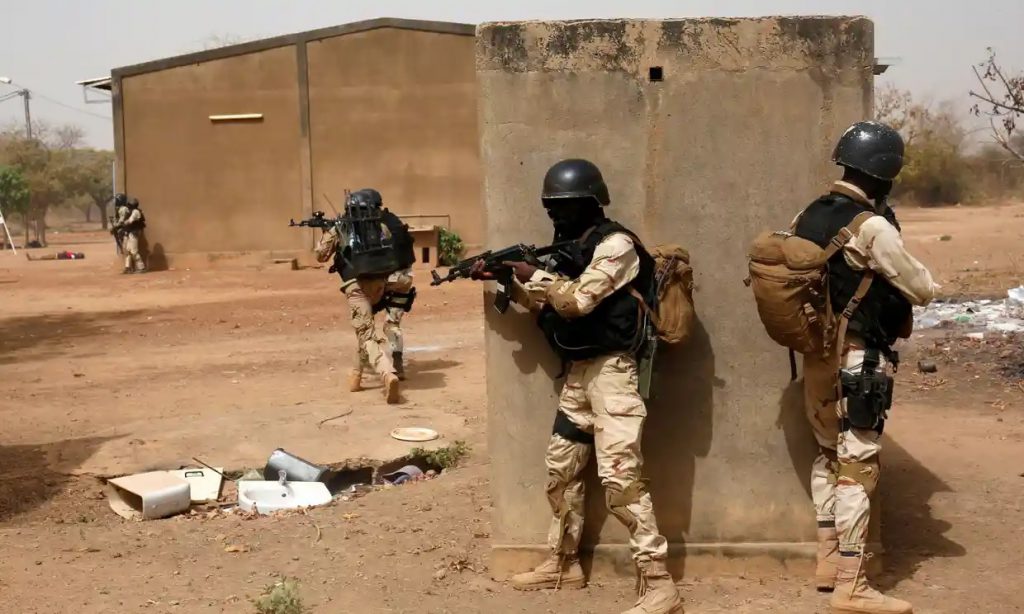Children bear the brunt as extremism and climate crisis drive almost 500,000 people from their homes.

The UN food agency has warned of an “escalating humanitarian crisis” in Burkina Faso, driven by growing extremist violence and the long-term impact of climate crisis in the arid central Sahel region.
A sharp increase in attacks, the result of the west African country becoming embroiled in the jihadist insurgency that began in the region in early 2015, has forced almost half a million people from their homes.
Malnutrition is past emergency levels. One in five displaced children is malnourished, UN staff said.
“A dramatic human crisis is unfolding in Burkina Faso that has disrupted the lives of millions,” said the World Food Programme’s (WFP) executive director, David Beasley.
“Close to half a million people have been forced from their homes and a third of the country is now a conflict zone. Our teams on the ground are seeing malnutrition levels pushed well past emergency thresholds – this means young children and new mothers are on the brink. If the world is serious about saving lives, the time to act is now.”
The number of attacks in Burkina Faso in the first half of 2019 surpassed the total for 2018, with reported civilian deaths four times the total for last year. Schools have been forced to close and, in a country where four out of five people depend on farming for their livelihoods, people are abandoning their fields.
At least 486,000 people have fled their homes in Burkina Faso, bringing the total number of people displaced across the Sahel to 860,000. The WFP said 2.4 million people in the central Sahel area need food assistance. As communities take in displaced people, resources are further stretched.
Earlier this year, US military officials warned that the rapid and alarming deterioration of the security situation in Burkina Faso was threatening the destabilisation of a vast area of west Africa.
The WFP, which is assisting 2.6 million people in Mali, Burkina Faso and Niger, said it faced the “immense challenge” of providing immediate humanitarian needs, while protecting investments made in resilience and self-sufficiency. It needs an additional $150m (£116m) for operations in the three countries.
Marwa Awad, a WFP spokeswoman who was last week in Kaya, 90 minutes from the capital of Burkina Faso, Ouagadougou, said the number of displaced people had “skyrocketed” in the past three months. Some families had walked 200km, she said.
“A lot of people running away from the violence in the north have moved southwards,” said Awad.
“We talked to people who painted gruesome accounts of people being shot at the market. They had walked for days and they arrive at displacement centres, where they wait all day to be registered and then wait for a host community to let them in.”
Awad said host communities in the south had been generous to those displaced.
Those who had fled the violence in the north, an area with much poverty, a lack of basic services, weak government and other problems, told Awad of armed groups exploiting economic inequalities to recruit young people.
“Mali is already in the grip of chaos and so that is why we are sounding the alarm on Burkina Faso,” she said.
“We don’t want another Syria. I covered Syria for three years and people were more well-versed in the layers of uprising and extremism. But people here have told us they are seeing the exploitation of inequality, with young people joining armed groups.”
Half of the country’s population are young, said Awad, who warned of an increase in human trafficking in the Sahel – a known smuggling route – were the situation allowed to continue.
Earlier this month, in the deadliest attack in recent years, at least 37 civilians were killed in an ambush on a convoy of workers for the Canadian gold mining company Semafo, in eastern Burkina Faso.
The military is struggling to contain Islamist violence that has overrun parts of the country. Attacks by militants have claimed 700 lives since early 2015. Many of the attacks have been attributed to groups affiliated with al-Qaida and Islamic State.
